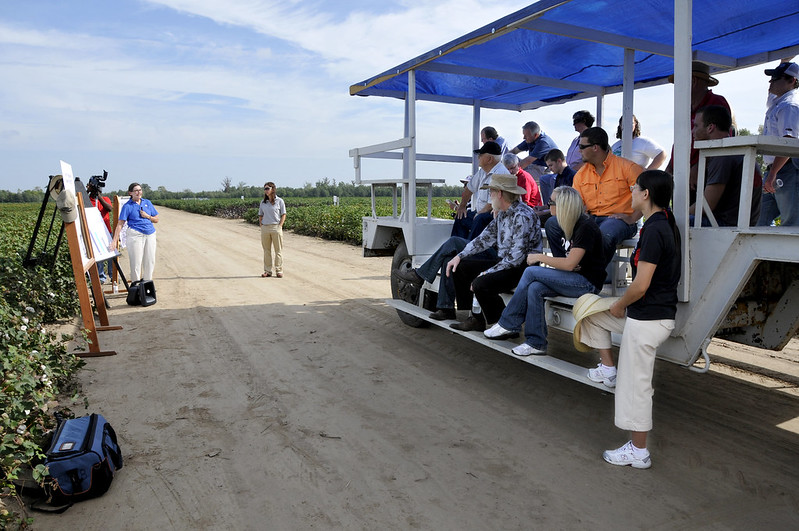June 22 field day talks cotton sustainability on the farm and in the stores
Judd Hill event focuses on production tactics and values beyond the field
June 13, 2022
By Mary Hightower
U of A System Division of Agriculture
Fast facts
- Cotton Sustainability Field Day set for June 22
- Field-scale soil health demonstrations
- RSVPs encouraged
(430 words)
(Newsrooms: with file art at https://flic.kr/p/2m3AoJH; ‘Reichle’ in 9th graf is CQ)
NEWPORT, Ark. — A June 22 field day at the Judd Hill Foundation Farm near Trumann, will feature discussions on why sustainability is important not only to cotton farmers, but also to the brands that use American-grown cotton and their consumers.
The Cotton Sustainability Field Day will begin with registration at 8 a.m. that Wednesday. The farm is located on Arkansas Highway 214, five miles south of Trumann in Poinsett County.

Field tours highlighting soil and water conservation research and field-scale soil health demonstrations will begin at 9 a.m. Attendees are encouraged to RSVP for this event.
For more information, contact Bill Robertson, extension cotton agronomist for the University of Arkansas System Division of Agriculture, at (501) 425-0549 or by email at brobertson@uada.edu.
The Global Sustainability Study 2021, conducted by global strategy and pricing consultancy Simon-Kucher & Partners, found significant global paradigm shifts in how consumers view sustainability and the associated generational differences in willingness to pay for sustainable products and services.
Globally, 85 percent of people indicate that they have shifted their purchase behavior towards being more sustainable in the past five years, the study found.
“Sustainability encompasses so much. It’s soil and water conservation, but it also means finding ways to keep farmers and those that use their products in business,” Robertson said. “That’s what we’ll be demonstrating and discussing during this field day.
“Farmers, crop consultants and others interested in learning more about sustainably produced cotton are encouraged to attend,” he said.
The agenda includes:
- Marty White and Jesse Flye, producers at Judd Hill, will discuss their experiences with conventional and conservation systems including cover crops.
- Adam Chappell, producer and president of Arkansas Soil Health Alliance, will discuss regenerative practices.
- Updates from the Soil Health Institute and the U.S. Cotton Trust Protocol will focus on the importance of practices to improve soil health, and how to document our practices to improve our transparency and build consumer confidence.
- Hank Reichle, president and chief executive officer of Staplcotn, will discuss what manufacturing brands desire from farmers to better meet the needs of consumers.
- The Better Cotton Initiative and BASF will discuss the Better Cotton and e3 Sustainable Cotton programs.
Training and enrollment opportunities for the U.S. Cotton Trust Protocol will be offered to farmers and consultants on laptops that will be setup in the air-conditioned office after lunch. Sponsors for this event include Judd Hill Foundation, Inc.; Cotton Incorporated; Soil Health Institute and Better Cotton.
Arkansas farmers are expected to grow about 520,000 acres of cotton this year, up 8 percent from the previous year.
To learn more about Division of Agriculture research, visit the Arkansas Agricultural Experiment Station website: https://aaes.uark.edu. Follow on Twitter at @ArkAgResearch. To learn more about the Division of Agriculture, visit https://uada.edu/. Follow us on Twitter at @AgInArk. To learn about extension programs in Arkansas, contact your local Cooperative Extension Service agent or visit www.uaex.uada.edu.
About the Division of Agriculture
The University of Arkansas System Division of Agriculture’s mission is to strengthen agriculture, communities, and families by connecting trusted research to the adoption of best practices. Through the Agricultural Experiment Station and the Cooperative Extension Service, the Division of Agriculture conducts research and extension work within the nation’s historic land grant education system.
The Division of Agriculture is one of 20 entities within the University of Arkansas System. It has offices in all 75 counties in Arkansas and faculty on five system campuses.
Pursuant to 7 CFR § 15.3, the University of Arkansas System Division of Agriculture offers all its Extension and Research programs and services (including employment) without regard to race, color, sex, national origin, religion, age, disability, marital or veteran status, genetic information, sexual preference, pregnancy or any other legally protected status, and is an equal opportunity institution.
# # #
Media contact: Mary Hightower, mhightower@uada.edu.